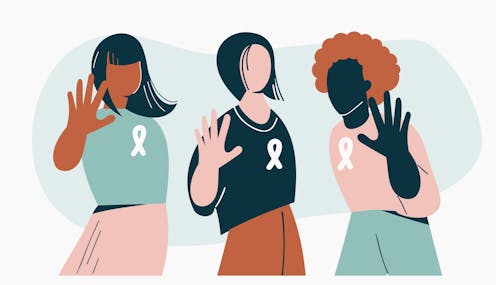what family violence survivors want policy makers to know
- Written by Sarah Moulds, Senior Lecturer of Law, University of South Australia

For a long time, policy makers and legislators seeking to address the problem of domestic and family violence[1] have sought higher penalties and tougher laws[2]. But when it comes to finding practical solutions to this complex problem, the voices of those with lived experience of the system have not always been heard.
A recent study[3] I coauthored with Suryawan Rian Yohanesh from Uniting Communities[4] (an NGO focused on overcoming disadvantage) involved interviews with survivors of domestic and family violence about what changes they’d like to see.
Our interviewees told us they want changes giving them control over legal processes like intervention orders[5] (sometimes called “Apprehended Violence Orders” or AVOs), which are legal orders designed to stop perpetrators of violence or abuse from being near or interacting with their partners or children.
Currently, if you want to obtain one of these orders, the police and prosecutor often lead the process. They generally decide whether it goes to court, what evidence is collected or used and what parameters that order has (such as whether the perpetrator can collect kids from school or access firearms). The abuse survivor can feel shut out of these decision-making processes.
Survivors also told us they need longer term support.
Read more: How Victoria's family violence system fails some victims – by assuming they're perpetrators[6]
Getting the first response right
Survivors of violence, and those working to support survivors, want programs focused on getting the first response right every time. As one service provider said:
Being told that your abuse is ‘not serious enough’ or there is no abuse identified is one of the most damaging things that can happen. It can impact the relationship of trust going forward. It is therefore critical first responders are adequately trained in trauma-informed care and practice, and have training in best practice responses to domestic violence, so that the victims can also be referred to suitable support services.
If that first response (by police, for example) is dismissive or re-traumatising, it can leave survivors vulnerable to ongoing violence and harm, and distrustful of the legal system. As one survivor said:
I didn’t feel like I was taken seriously or believed. [I was] made to feel like I was being judged as hysterical, ridiculous and time wasting. This made me feel unsafe to approach police again which was fairly scary, because they were the place I was supposed to be able to count on to help, and I wasn’t sure where else I could go.
This type of response can be devastating for women and families already experiencing disadvantage or isolation, including First Nations women[7], culturally and linguistically diverse women, women with disabilities[8] and women living in regional areas[9]. Many of these groups already face myriad practical barriers when it comes to reporting violence.
A mishandled first response can reinforce narcissistic or controlling behaviour[10] by perpetrators, who use these experiences as evidence of their own power. To say, “See, I told you nobody would believe you.” One interviewee said:
The system that is being built to protect women from this type of abuse can be turned into a weapon in the hands of those men that are seeking to perpetuate control against their partner or their family.
Survivors said they want greater focus on perpetrator accountability by exposing the true impact of the violence on the lives of others, not just the aspects of the behaviour leading to criminal offences or breaches of the law.
This means engaging professionals to help the survivor confront the perpetrator with the broader health, financial and social impacts of their behaviour.
With this support team, the victim survivor could be encouraged to develop a strong recorded, accumulative evidence case. And these other professionals could be empowered to confront the defendant about the harm that he is causing to his partner, and in many cases also to his children.
These practices should be informed by cultural knowledge[11] and supported by community leaders who can help improve awareness of the rights of women. The support team could also help identify pathways for safe repair of relationships, social connection and financial security.
Longer term support
Survivors also need longer term support packages, including opportunities to access tertiary education or training[12] and specialist legal and financial services.
As one participant told us:
I’d really like to see some kind of focal point, resources for [domestic violence] survivors. To support people to rebuild their lives. Getting the universities and tertiary institutions to help with retraining and teaching, employment. Somewhere where people can break back in. Including social life, as well as financial security and employment.
Those with lived experience of domestic and family violence want perpetrators to be held to account – not just in the courtroom, but in their workplaces and their social networks.
They want to be put at the centre of the system, and be recognised as the powerful agents for change they are.
No legislation is good enough until people with lived experience have been consulted […] All these people with lived experience are not being heard. They are the ones that have the knowledge. Every time you don’t go to the coal face you miss the point.
Read more: Finally, police are taking family violence as seriously as terrorism[13]
References
- ^ domestic and family violence (www.anrows.org.au)
- ^ tougher laws (www.agd.sa.gov.au)
- ^ study (www.rightsnetworksa.com)
- ^ Uniting Communities (www.unitingcommunities.org)
- ^ intervention orders (www.police.sa.gov.au)
- ^ How Victoria's family violence system fails some victims – by assuming they're perpetrators (theconversation.com)
- ^ First Nations women (www.anrows.org.au)
- ^ women with disabilities (www.anrows.org.au)
- ^ women living in regional areas (aifs.gov.au)
- ^ narcissistic or controlling behaviour (theconversation.com)
- ^ informed by cultural knowledge (www.anrows.org.au)
- ^ access tertiary education or training (www.monash.edu)
- ^ Finally, police are taking family violence as seriously as terrorism (theconversation.com)

















